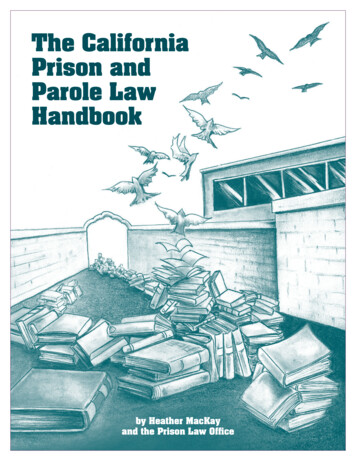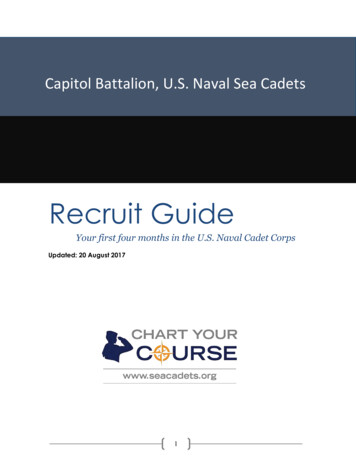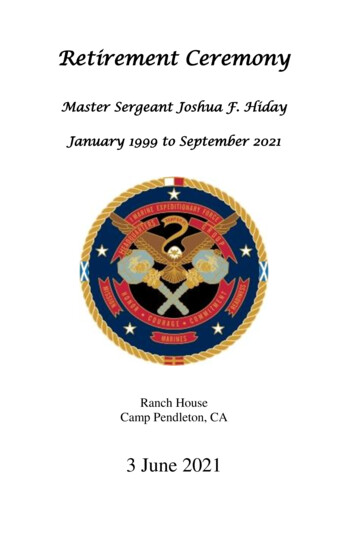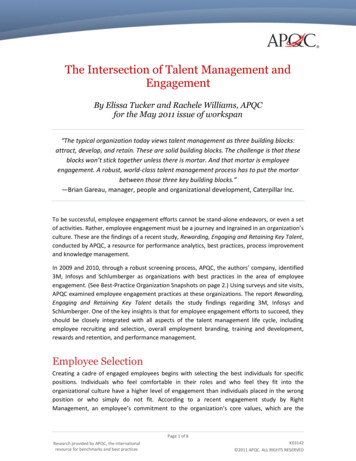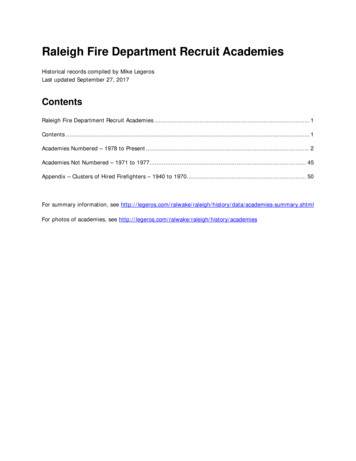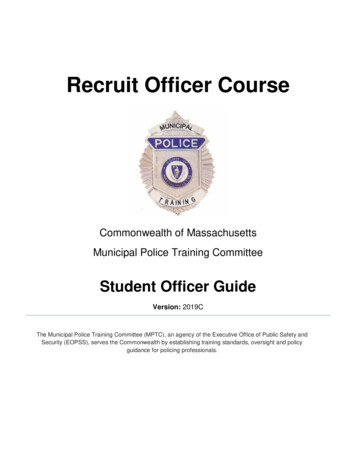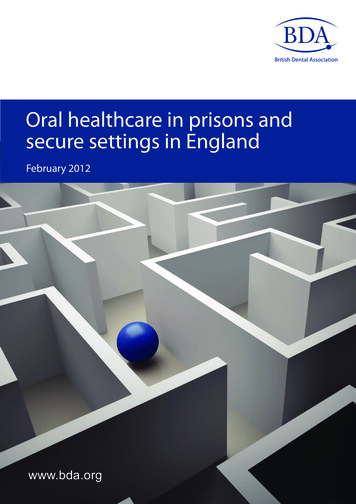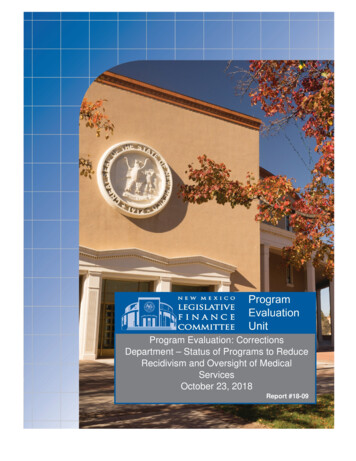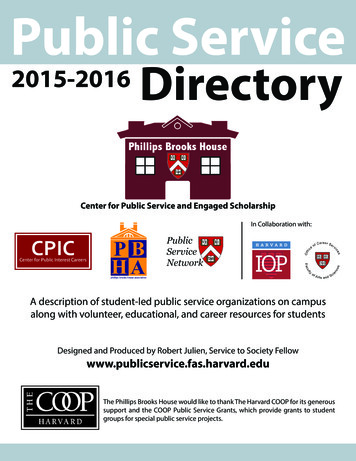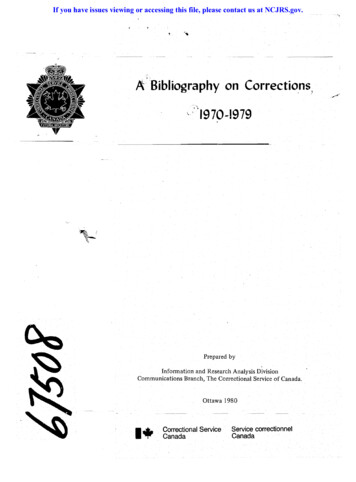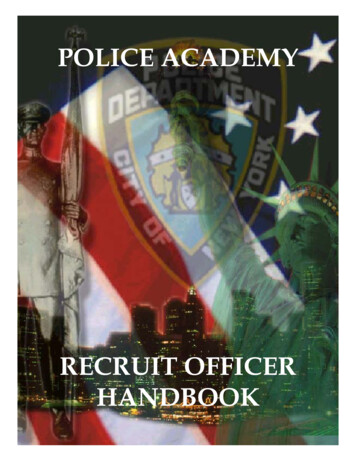
Transcription
POLICE ACADEMYRECRUIT OFFICERHANDBOOK
JANUARY 2005James J. Fyfe, Ph.D.Deputy Commissioner, TrainingDeputy Chief Diana L. PizzutiCommanding Officer, Police AcademyInspector Raymond SpinellaExecutive Officer, Police AcademyInspector Steven J. SilksCommanding Officer, Firearms and TacticsSectionDeputy Inspector Scott T. LoosCommanding Officer, Recruit TrainingSection
MISSION OF THE NEW YORK CITYPOLICE DEPARTMENTThe mission of the New York City PoliceDepartment is to enhance the quality of lifein New York City by working in partnershipwith the community to enforce the law,preserve peace, reduce fear, and maintainorder. The Department is committed to accomplishing itsmission to protect the lives and property of all citizens ofNew York City by treating every citizen with courtesy,professionalism, and respect, and to enforce the lawsimpartially, fighting crime both through deterrence and therelentless pursuit of criminals.VALUES OF THE NEW YORK CITY POLICEDEPARTMENTIn partnership with the community, we pledge to: Protect the lives and property of our fellow citizens andimpartially enforce the law. Fight crime, both by preventing it and aggressivelypursuing violators of the law. Maintain a higher standard of integrity than is generallyexpected of others because so much is expected of us. Value human life, respect the dignity of each individualand render our services with courtesy and civility.
MISSION OF THE TRAININGBUREAUThe Training Bureau is committed toprotecting the lives, rights, propertyand dignity of all New Yorkers andvisitors to our city by providing allmembers of the service with the besttraining possible.The TrainingBureau is committed to the task of ensuring that all membersof the Department benefit from training, maximizing theirprofessional and personal development and well-being.Training is aimed at instilling and fostering a level ofconfidence and knowledge that allows the finest PoliceDepartment in the world to meet the daily challengesassociated with an ever changing and complex environment.The Training Bureau continually conducts research toensure that programs are contemporary and pertinent.Certified instructors are utilized to provide training for all newpolice officers and civilian employees. Training is designedto focus on continuing in-service education, to prepare onsibilities, and for those being assigned to specializedduties. The Training Bureau assists other Departmentalunits in developing and providing training and seeks outeducational opportunities for members of the service.
SECTION 1 - INTRODUCTION1-1GREETINGSWelcome to the New York City Police Academy. You have been chosen toundertake one of the most rewarding careers available.Over the course of the next several months, you will receive the trainingnecessary to become a service-oriented, community minded, publicservant. Our training courses are designed to integrate the ideals, needs,and desires of those we serve with the tools, knowledge, and expertiseneeded to get the job done. This training will produce a police officer thatis able to work in partnership with the community to achieve desired goalsand expectations.The Academy curriculum consists of a variety of subjects that includepolice science, law, behavioral science, firearms, tactics, physicaleducation, and driver training.Upon graduation from the Police Academy, you will have earned collegecredits that are recognized by most state and city universities. A collegeeducation is required for all Civil Service promotions. Therefore, if youhaven’t already completed your college education, we encourage you todo so after leaving the Academy. The Department offers undergraduateand graduate scholarships.Your training does not end when you graduate from the Police Academy.Through Precinct Level, In-Service Training, Specialized Training, andLeadership Development police officers are continually trained andeducated regarding developments in law, tactics and Departmentguidelines.The Police Academy staff is committed to helping you succeed. You haveto make a commitment to do what is required to be successful.Resources, such as tutoring, are available to help every recruitsuccessfully complete Academy training. Tutoring is available to everyrecruit to reinforce all aspects of training. Recruit training at the New YorkCity Police Academy is the most extensive program of any policedepartment in the United States.1-2SETTING THE EXAMPLEAs a police officer you must present a good example to the public bybeing diligent in obeying laws, traffic regulations, ordinances, and rulesand regulations. As a representative of the City’s authority, you must
conduct yourself impartially, ever aware that the Department is judged bythe acts of its individual members.Recruit officers are prohibited from using, buying, possessing or sellingmarijuana, dangerous drugs or other controlled substances, or fromfrequenting places where these substances are being sold, used, orpossessed. During the training period at the Police Academy, eachrecruit will be tested for drug use.In addition, recruit officers are not permitted to patronize - AT ANY TIME an unlicensed premise (including dance clubs, social clubs, after hoursclubs, etc.) where alcoholic beverages are being sold or dispensedillegally. Any of the above violations will result in termination.Furthermore, a member of the service who has any interest in orassociation with premises where illegal gambling operations take place, orwhich is being used as a smoke shop, an after hours club, or for othersimilar illegal activities, will be terminated (Reference: Patrol Guide 20310 sub 10, 206-07 sub 2f; 3e).You must avoid behavior that may bring adverse criticism to theDepartment. Your conduct, whether on or off duty, shall merit theconfidence and respect of the public as well as your fellow officers.1-3POLICE OFFICER STATUSAs a probationary police officer, you are a uniformed member of theservice. Therefore, you are subject to all lawful orders of the PoliceCommissioner, and all ranking officers. Orders of a supervisor of any rankor Police Academy Instructor - including a police officer - must be obeyed.If you become involved in ANY police-related occurrence or witness acrime or other police emergency, you must report it and await the arrivalof a trained police officer. When remaining at the scene is inappropriate,the MOS may leave the scene; however, said member must immediatelyreport facts to the Desk Officer of the precinct concerned (or theOperations Unit 646-610-5580, if outside NYC). The recruit officer mustobtain the page number of the Command Log entry for the incident. Thiswould also include circumstances where you may be personally involved.Recruit officers must comply with Patrol Guide procedure 212-32.Reporting an emergency or criminal activity to the Police Departmentrequires calling 911. When a police operator answers: Give your location. Be specific.
Identify yourself as a probationary police officer assigned to thePolice Academy, and specify whether you are on or off duty. Give details of the incident, including a description of suspiciouspersons at the scene. If you are reporting a crime or suspicious occurrence, give adescription of yourself and your clothing – you do not want to bemistaken for an offender or criminal suspect.At the first opportunity, you must notify the Police Academy of theincident. Do this by calling the Recruit Operations Unit at 212-477-9790 or212-477-9721. Upon your return to the Academy, notify your OfficialCompany Instructor (OCI) and prepare a report for the CommandingOfficer, Police Academy. An example of the format for a Departmentreport can be found in the appendix of this handbook.YOU WILL RECEIVE FURTHER DETAILED INSTRUCTIONSREGARDING YOUR DUTIES AND RESPONSIBILITIES AS ANUNARMED RECRUIT OFFICER DURING YOUR ACADEMY TRAINING.1-4EQUAL EMPLOYMENT OPPORTUNITY POLICY STATEMENTThe New York City Police Department is an Equal Opportunity Employer.Our current Police Commissioner, Raymond W. Kelly, has reaffirmed thePolice Department’s strong commitment to maintaining fair employmentpractices for all of its members.Federal, State and/or local laws prohibit employment discrimination basedon: Age Alien Status Race, Color, Creed Marital Status National Origin Prior record of arrest or conviction (under some circumstances) Disability Gender Religion Sexual OrientationIn addition to those persons who fall within one of the protected groups,those that are “perceived” to be within one of the categories or who have a“known relationship or association” with someone who is, or is perceivedto be, within one of the categories, are also protected.
The laws prohibit discrimination in: HiringAssignmentsWorking ConditionsSalary and iplineTerminationAny other terms and conditions of employmentThe law requires that reasonable accommodations be made foremployees with disabilities. The law also requires that reasonableaccommodations be made for employees’ religious observances.All employees are directed to comply with both the letter and the spirit ofthese laws. All personnel should work to maintain an atmosphere ofappreciation of the diversity reflected in our staff, and to promoteunderstanding among our co-workers.Managers and supervisors are directed to make all employment decisionsin accordance with the Police Department’s EEO Policy, and to ensurecompliance with the policy in their areas of responsibility.If any employee feels that a manager, supervisor, or another employeehas discriminated against them, he or she should contact the EqualEmployment Opportunity Officer or an Equal Employment OpportunityCounselor.The office of Equal Employment Opportunity may becontacted at 646-610-5330; it is located in Room 1204, One Police Plaza.A list of the Equal Employment Opportunity Liaisons and where they maybe contacted is provided in the EEO Policy Booklet available from theOffice of Equal Employment Opportunity.The Equal EmploymentOpportunity Officer has the authority to recommend to the PoliceCommissioner that disciplinary action be taken against any employee whohas committed an unlawful discriminatory act.All complaints will be handled in confidence. No employee may retaliateagainst or harass any person for filing a complaint or cooperating with theinvestigation of a complaint. Such retaliation or harassment is unlawfuland will be cause for disciplinary action.Note: Complaints of Sexual Harassment or Discrimination can be filedwith the Police Academy Human Resources Unit located in Room 820.
1-5SEXUAL HARASSMENT POLICY STATEMENTSexual Harassment that affects one’s job is a form of employmentdiscrimination prohibited by law. All New York City Police Departmentemployees should familiarize themselves with the guidelines in this policystatement so that they will understand what type of conduct is prohibited,and know the remedies available to anyone who has experienced sexualharassment.Guidelines issued by the Equal Employment Opportunity Commissionstate that unwelcome sexual advances, requests for sexual favors andother verbal or physical conduct of a sexual nature constitute sexualharassment when:1. Submission to such conduct is made either explicitly or implicitly aterm or condition of an individual’s employment;2. Submission to or rejection of such conduct by an individual is usedas the basis for employment decisions affecting such individual; or3. Such conduct has the effect of unreasonably interfering with anindividual’s work performance or creating an intimidating, hostile, oroffensive work environment.These guidelines are not meant to interfere with voluntary socialrelationships between individuals in the workplace, but they do prohibitthose actions and behaviors that are unwanted and unwelcome and/orwhich create an intimidating and hostile work environment.There is a broad range of conduct by supervisors and co-workers whichcan, in certain circumstances, be considered sexual harassment, and thisincludes, but is not limited to, sexually suggestive remarks, sexuallysuggestive pictures, sexually suggestive gesturing, verbal harassment orabuse of a sexual nature, subtle or direct propositions for sexual favors,and any unnecessary touching, patting, or pinching.Any manager or supervisor who knows of a sexually intimidating or hostilework environment or who becomes aware that the terms and conditions ofan individual’s employment are based upon submission to sexual conductmust consult with the EEO Officer immediately.Any employee who has a complaint about sexual harassment is urged tocontact the EEO Officer or an EEO Liaison. The office of EqualEmployment Opportunity Officer may be contacted at 646-610-5330; it islocated in Room 1204, One Police Plaza. Complaints of sexual
harassment will be handled in accordance with the Police Department’sEqual Employment Opportunity Complaint Procedure.All complaints will be handled in confidence. No employee may retaliateagainst or harass any person for filing a complaint or cooperating in theinvestigation of a complaint. Such retaliation or harassment is unlawfuland will be cause for disciplinary action.1-6FRATERNIZATION POLICYRecruit officers assigned to the Police Academy are STRICTLYFORBIDDEN to fraternize with instructors or with other Police Academystaff, of either gender, while on or off duty. For the purpose of this policy,fraternization is defined as: DatingSocializing (attending outside functions: parties, dinners, etc.)Car-poolingUnauthorized tutoringTaking meals or coffee breaksAny form of outside communication (telephone, E-mail, etc.)Recruits and staff members must maintain a professional relationship atall times. Any semblance of inappropriate behavior, favoritism, or sexualharassment damages our training efforts, and the credibility and reputationof this command and of the New York City Police Department. Suchconduct will not be tolerated.Violation of the fraternization policy is a serious offense that willresult in disciplinary action and/or termination.SECTION 2 - RULES AND REGULATIONS2-1GENERALThe New York City Police Department is a paramilitary organization. TheDepartment maintains rules and regulations similar to the military. Theserules and regulations instill discipline and maintain uniformity. You areresponsible for knowing all of the rules and regulations describedherein. You must also familiarize yourself with the Department’sPatrol Guide, particularly as it pertains to General Regulations (PatrolGuide Section 203). Any recruit officer that disobeys the lawful order of a
ranking officer, or who is otherwise found lacking in the performance ofduty, will be disciplined and/or evaluated for suitableness of continuedemployment as a police officer.2-2FITNESS FOR DUTYYou must be fit for duty at all times, except when on Sick Report. As arecruit officer you are on-call 24 hours a day. Your uniforms must becleaned and pressed; your equipment must be maintained andavailable at all times; and you must be prepared not only for classbut also for emergency police duty. It is not uncommon for policeacademy recruits to be called upon to perform police services duringemergency situations. Therefore, you must carry equipment issued by theDepartment as well as equipment that you are required to purchase.This equipment includes, but is not limited to: 2-3Department issued traffic vestAuthorized flashlightRaincoat, etc.ATTENDANCEAttendance is mandatory for each day that you are scheduled to performduty. Absences from training will be detrimental to your success at theAcademy. The Department recognizes that in limited circumstances recruitofficers may become sick or injured during their assignment to theAcademy. While the Department maintains a sick leave policy, utilizationof sick leave will be closely scrutinized. Abuse of the Department’s sickleave policy will lead to disciplinary action and possible termination.As probationary police officers you are required to notify the Departmentof your whereabouts. If you are absent from any training (the PoliceAcademy, Driver Training, Firearms Training, Field Assignments, etc.),and your absence is not accounted for, an investigation will commenceand you may be subject to disciplinary action.This means that if you are unaccounted for, the Department will sendsupervisors and police officers to look for you.Absence without authorization is a serious infraction and may leadto suspension and/or termination.
2-4DAYS OFF (AUTHORIZED LEAVE)Recruit Officers, while in attendance at the Police Academy, will not beauthorized to take days off, other than regular days off (RDO’S) unlessauthorized by the C.O., Recruit Operations Unit.2-5PUNCTUALITYYou must be punctual in reporting for training and other assignments.Repeated lateness will be considered a lack of capacity to perform policeservice. If you are going to be late, you must call the Police AcademyRecruit Operations Unit at (212) 477-9721 or (212) 477-9790. Inform theSupervisor of your reason for delay, and upon arrival, report to the RecruitOperations Unit, Room #523. If you are one (1) hour or more late, youwill be issued a Command Discipline. If there are circumstancesbeyond your control (i.e., you are involved in a motor vehicle accident,there is a power outage while you are using public transportation, etc.)and you produce DOCUMENTATION that can be verified, the incident willbe given consideration regarding any disciplinary action.2-6CONDUCTPolice officers are expected to maintain self-discipline and present apositive image to the public. A recruit’s behavior, conduct and ability toconform to the rules and regulations of the Police Academy are underconstant scrutiny and evaluation by the staff.You are responsible for knowing – and strictly abiding by – the rulesand regulations of the Academy and the Department.1.You must perform all duties as directed by a competent authority.You must obey lawful orders and instructions of supervising officers. YourAcademy instructors, regardless of rank, are considered supervisingofficers.2.RECRUIT OFFICERS SHALL NOT SOCIALIZE WITH ANYMEMBER OF THE POLICE ACADEMY STAFF, EITHER ON DUTY OROFF DUTY, IN PERSON OR BY ELECTRONIC MEANS, WHILEASSIGNED TO THE POLICE ACADEMY. VIOLATION OF THIS RULEWILL LEAD TO DISCIPLINARY ACTION AND / OR TERMINATION.3.You must be familiar with the contents of the Patrol Guide and mustperiodically update it as necessary.
4.You must maintain a current New York State Driver’s License andnotify your Commanding Officer with pertinent details if your license issuspended, revoked or not renewed.5.Eating in the Academy is permitted only in the Cafeteria located onthe third floor. No eating is allowed on the Campus Deck or MusterDeck. No food or drinks are allowed in locker rooms or classrooms.Recruits are responsible to properly hydrate themselves in preparation forstrenuous physical activity during warm weather. When in uniform, youwill not eat in public view other than in bona-fide restaurants. You willrestrict your meal location to the Cafeteria or any of the eatingestablishments in the area. However, eating in a licensed premise (i.e., alocation that sells alcohol for on-premise consumption) is STRICTLYPROHIBITED. Before leaving the Cafeteria, you will dispose of your trashin a proper receptacle.6.Recruit officers, while in uniform, will not smoke in public view. ThePolice Academy is a smoke-free environment; SMOKING IS STRICTLYPROHIBITED IN THE POLICE ACADEMY.7.You are required, on a daily basis, to check all official information,orders, and schedules that are posted on bulletin boards on the third,fourth, and fifth floors of the Academy. You are responsible for complyingwith all posted directives.8.When addressing or being addressed by a ranking officer or anAcademy staff member, you must stand at attention. A recruit officer mustgive his/her name, company number, and shield number if issued, toanyone who requests it.9.Attention in ranks is mandatory. Talking in class or in formation isprohibited. Inappropriate, unprofessional, or raucous behavior will not betolerated.10.Upon issuance of an identification card, you must carry it on yourperson at all times.a.when required to sign Department reports or forms, sign withfull first name, middle initial, and surname.11.Recruits are NOT permitted in any area of the 6th floor of the PoliceAcademy, to the right of the elevators, unless expressly directed by asupervisor from the Recruit Operations Unit. Recruits are only permitted inthe library.
12.You must enter and exit the Police Academy building through themain entrance on the Campus Deck. When entering the Academy, recruitofficers will comply with any instructions and/or demand for inspectionsmade by members of the Police Academy Staff or Security Unit. At notime will recruit officers block any entrances or exits to the Academy.Recruits will exit the Academy expeditiously; congregating on corners orblocking sidewalks will not be tolerated. Other than authorized meal,Recruits are not allowed to leave the Police Academy. Shouldcircumstances arise requiring your presence outside the Police Academy,permission to leave must be obtained from a supervisor in RecruitOperations.13.Recruits are not authorized to use any elevators without an elevatorpass.14.A Line-of-Duty injury, if one occurs, must be reportedimmediately. Failure to report a potential Line-of-Duty injury promptlymay result in disapproval of Line-of-Duty designation. Denial of a line-ofduty designation may result in the loss of benefits associated with suchdesignation.15.Recruit officers may not consume intoxicants while on duty whetherin uniform or in civilian clothes, or while off duty and in uniform.Intoxicants will also not be consumed en-route to or from the PoliceAcademy. Recruit officers will not enter premises serving intoxicants,while on duty or in uniform.Authorized meal locations are bona-fide restaurants (those without bars)within the confines of the 13th Precinct, and the Police Academy Cafeteria.After completing a tour of duty at the Police Academy, Recruit Officers arenot to remain within the confines of the 13th Precinct.The boundaries of the 13th Precinct include 14th Street, north to 30thStreet, from the East River to 7th Avenue.Recruit officers, in uniform or civilian clothes, on or off duty, may not enterany licensed premise with an on-premise consumption of alcoholicbeverages permit in the following situations: Within the confines of the 45th Precinct when assigned tothe Outdoor Range,Within the confines of the 63rd Precinct while assigned toDriver Training, orThe 84th Precinct while assigned to training classes inBrooklyn.Within the vicinity of John Jay College
16.Recruit officers may not congregate in public places while inuniform nor obstruct sidewalks when walking to or from the Academy.17.You may not patronize street peddlers/vendors, or eat food orrefreshments in public, while in uniform. Recruit officers, while in uniform,may not eat when on streets, in parks, on private stoops or in publicconveyances.18.You may not play cards or games of chance in the Police Academyor in any Department facility. You may not engage in illegal gamblinganywhere at anytime.19.Whether on or off duty, you may not use vile or indecent languageand you may not be loud or boisterous or engage in raucous conduct atany time. This also applies to situations that may arise between recruits.You will maintain a professional, controlled demeanor at all times,respecting the rights and dignity of every individual. Recruit officers thatvoluntarily engage in any type of physical and/or verbal altercations will beseverely disciplined.20.Recruit officers must not congregate or talk in the corridors orstairwells. Halls will be inspected periodically to insure compliance. Youmust keep to the right whenever possible when using stairways andcorridors in the building. You must not stand or congregate on stairwaysor in corridors in such a manner as to obstruct the passage of otherpersons. Stairway entrances and doors shall remain clear AT ALL TIMES.If circumstances arise where recruits are blocking free passage ofstairways or hallways, and a non-recruit is approaching, the first person toobserve him/her will loudly state, “Make way recruits,” or “Make way.”All recruits will immediately move to the right until the non-recruit passes.If recruits are waiting on line to use any vending machine, and aninstructor also desiring to use the machine approaches, all recruits willtake two (2) sidesteps to the right and remain so positioned until theinstructor departs.21.Recruits will not chew gum or hold toothpicks in their mouths whilein uniform.22.You must respect the rights and property of others at all times.23.You must not tamper with building equipment such as firefightingequipment, audio-visual aids, lighting fixtures, or electrical outlets.Immediately notify an instructor or staff member of any equipmentdisturbance or breakdown. Do not attempt to repair any item(s). The
destruction, defacement, damage, or abuse of Department property willnot be tolerated.24.While preparing for roll call on the third floor Muster Deck, recruitofficers will not congregate within 6 feet of any of the four (4) perimeterwalls on the Muster Deck. Recruits will not throw any objects off theMuster Deck. Under no circumstances will a recruit lean over the MusterDeck ledge. Recruit officers will refrain from making unnecessary noisenear - or peering into the windows - of the apartment houses on the East21st Street side of the Muster Deck.25.You are prohibited from knowingly associating with any person ororganization:a. Advocating hatred, prejudice, or oppression of any racialor religious group.b. Disseminating defamatory material.c. Reasonably believed to be engaged in, likely to engagein, or to have engaged in, criminal activities.26.Police officers are permitted to use City of New York publictransportation free of charge. A recruit officer will use his/her identificationcard to gain free passage on public transportation in the City of New York.Until I.D. Cards are issued, recruits will pay for public transportation. Notall transportation is free for police officers. When issued to you,identification cards will be carried in a shield case affixed to the belt with achain (see page 20, step 17) to prevent loss. When traveling on publictransit, do not occupy a seat to the exclusion of paying passengers.In the event of a conflict with Transit Authority employees, such as busdrivers or token clerks, recruit officers should record the identification ofthe transit employee and report the facts of such incident to a supervisorin the Recruit Operations Unit.27.Recruit Officers may obtain free passage on the Long Island RailRoad and Metro North Train Systems only after applying for, and receivingtrain passes. Recruit officers must comply with the restrictions notedon the rear of the pass. Specifically, the privilege to ride at no cost doesnot provide for members of the service to sit or utilize additional seating tothe exclusion of paying passengers.28.Use of pay phones inside the Academy building is prohibited.Recruits may use the pay phones on the Campus Deck.
29.Privately operated/owned recruit vehicles must comply with allsafety, equipment and registration regulations set forth in the Vehicle andTraffic Law of the State of New York (e.g. properly registered in N.Y.S.,insured, in good repair, etc.).30.Registration information of private vehicles used by recruits fortransportation to and from the Police Academy must be supplied to theRecruit Discipline Unit as soon as possible. Registration information mustbe updated with the Recruit Discipline Unit when any informationregarding the vehicle changes.31.Recruit officers will NOT use, wear or carry Walkman-type radios,compact disk (CD) tape players, portable televisions or electronic gameswhile on duty or in uniform. This includes possessing these items in therecruit bag.32.Recruit officers will NOT use, carry, or wear cellular phones,beepers, or pagers while on duty or in uniform.33.Recruit officers will not read any unauthorized material while in thePolice Academy building. Authorized materials are those assigned orgiven to recruits by Police Academy staff.2-7CONDUCT WHILE TRAVELING IN PUBLICOn or off duty, while in uniform, or wearing or carrying any item that mayidentify you as a member of this Department, utilizing any type of publictransportation, or any type of transportation that is in public view, recruitofficers will not engage in the following conduct:1. Using loud, offensive, or profane language;2. Discussing or physically demonstrating department training or policy ina manner likely to be overheard or observed by the public;3. Occupying entire sections of train cars or buses with groups of otherrecruits;4. Eating, drinking or sleeping;5. Blocking exits, placing bags or other items on seats, in aisles, orblocking pedestrian traffic;6. Changing into civilian clothes or removing uniform items;
7. Failing to abide by customs and courtesies common on certain modesof transportation (i.e., remaining quiet on trains, consideration forsleeping passengers, etc.);8. Any other conduct which may be deemed prejudicial to the good orderof the department.As a recruit officer, you represent the department, whether on or offduty. Your conduct reflects upon the entire department.2-8THE SALUTEThe salute is a traditional gesture of greeting and mutual respect amongmilitary and police personnel. All recruit officers are required to render ahand salute under the following circumstances:- When entering the Police Academy or other Department facility, ahand salute must be directed to the front desk.- When walking past and
At the first opportunity, you must notify the Police Academy of the incident. Do this by calling the Recruit Operations Unit at 212-477-9790 or 212-477-9721. Upon your return to the Academy, notify your Official Company Instructor (OCI) and prepare a report for the Commanding Officer, Police Academy. An example of the format for a Department
